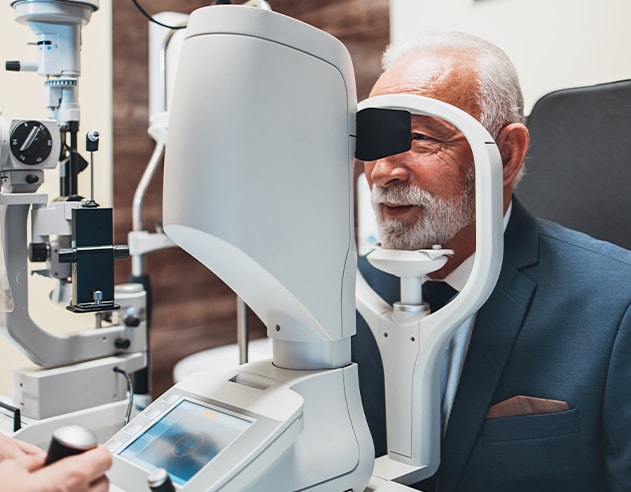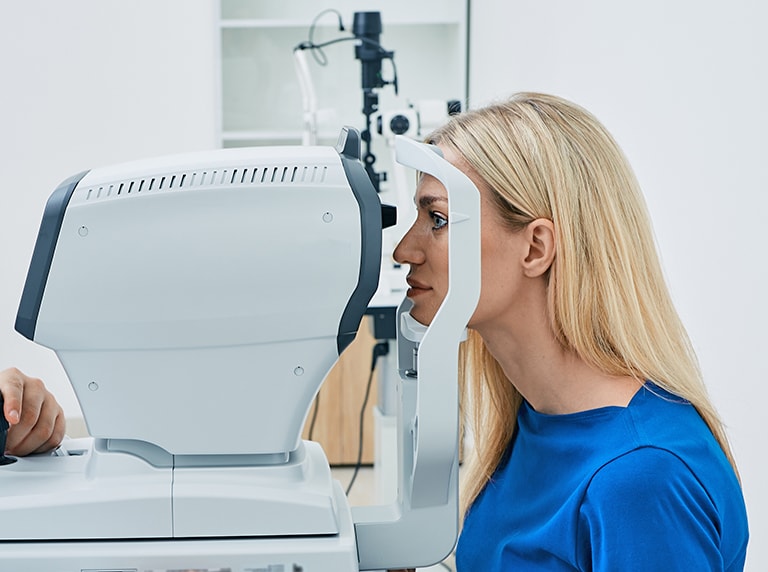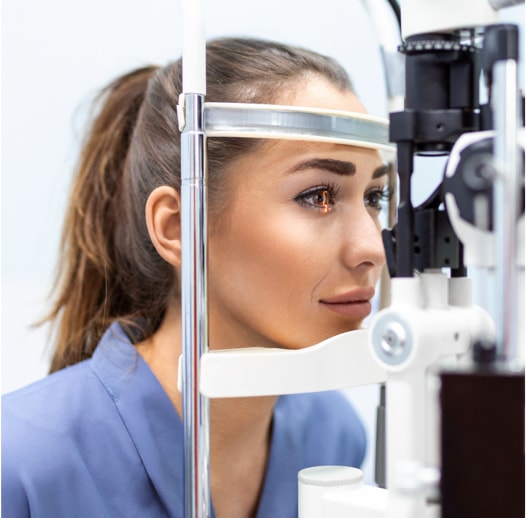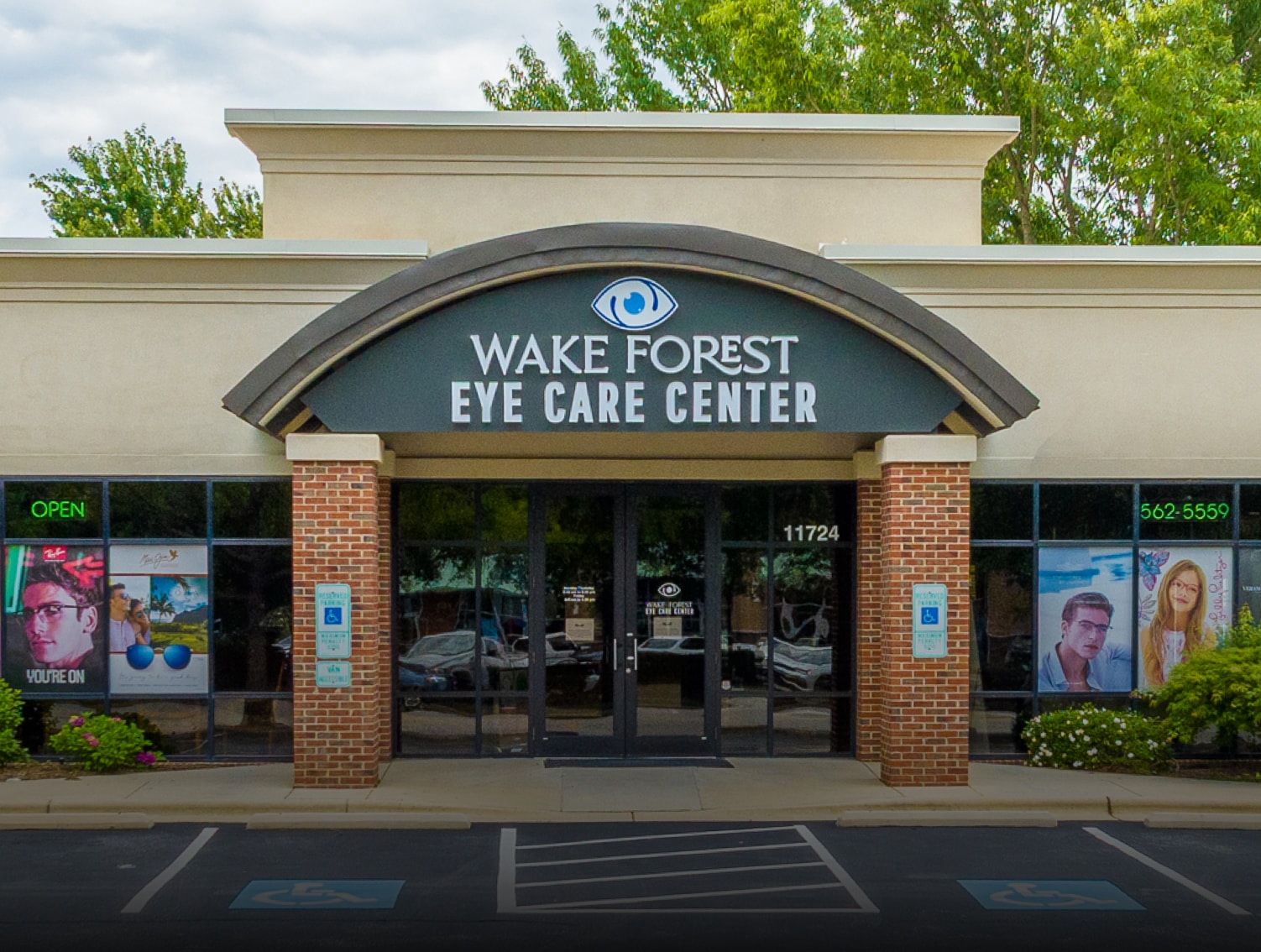Protect Your Vision & Overall Wellness
Diabetes can affect more than your blood sugar; it can have a significant impact on your eyes. At Wake Forest Eye Care Center, our diabetic eye exams provide a thorough, personalized look at your eye health to catch potential issues early and preserve your vision for years to come.
We combine diagnostic technology with individualized care, helping each patient receive our undivided attention throughout the exam. From assessing your retina to evaluating eye pressure and lens health, we provide strategies that support both your vision and overall wellness.
Don’t wait to address diabetes-related vision problems. Contact us to schedule your next exam today.
Request Appointment

How Diabetes Can Affect Your Eyes
High blood sugar from diabetes can damage the blood vessels in your retina, potentially leading to serious eye conditions such as diabetic retinopathy, diabetic macular edema, glaucoma, and cataracts. Regular exams are critical for early detection and treatment.
Managing your overall health, including stable blood sugar levels, supports your eye health and reduces your risk of vision complications. Our team works with you to monitor and protect your eyes while providing education on how diabetes impacts vision.
Detecting Diabetes-Related Eye Conditions
Many diabetes-related eye conditions develop without obvious symptoms, making comprehensive exams essential. Our doctors examine your retina, lens, and eye pressure using diagnostic technology, including:
- Optos Ultra-Widefield imaging: Captures high-resolution images of your retina, macula, and optic nerve in a single shot, helping detect early changes.
- Optical coherence tomography (OCT): Produces cross-sectional images of your retina to identify subtle signs of diabetic retinopathy or macular edema.
- iCare & Goldmann tonometry: Measures your eye pressure levels to detect signs of glaucoma.
- Dilation exams: Provide a thorough view of your eye’s internal structures to ensure no early signs of damage are missed.
These tools help our team create a proactive plan for managing your eye health and preserving your vision.
High blood sugar can affect the blood vessels in your retina, causing them to bulge, break, and leak fluid. When this event happens, it’s called diabetic retinopathy.
Diabetic retinopathy is an eye disease commonly associated with diabetes, and it could lead to permanent vision loss without treatment.
There are 2 types of diabetic retinopathy:
- Non-proliferative diabetic retinopathy is the most common and occurs earliest. This disease affects your retina’s blood vessels, causing them to leak fluid.
- Proliferative diabetic retinopathy, a more severe version, occurs when the retina develops abnormal blood vessels to compensate for fluid loss. These vessels break easily and can create scar tissue that may increase the risk of retinal detachment.
When diabetic retinopathy causes fluids to leak from damaged blood vessels, the fluid can build up in the central area of your retina called the macula, leading to a disease known as diabetic macular edema.
Your macula is responsible for providing the central vision you use to see fine details and read, but diabetic macular edema can affect this area over time and cause blurry vision or permanent vision loss.
Open-angle glaucoma is the most common form of glaucoma, a group of diseases that affect your optic nerve. As the disease develops, it can cause peripheral vision loss before leading to complete vision loss.
Diabetes can increase your risk of developing open-angle glaucoma.
A cataract is a common age-related eye condition that affects your crystalline lens.
However, diabetes can increase the risk of developing cataracts by allowing high blood sugar into your aqueous humor. Over time, your eye’s lens can become hazy or cloudy, leading to potential vision problems.
Take Control of Your Eye Health
Your eyes deserve careful, personalized care that considers your overall well-being. At Wake Forest Eye Care Center, our diabetic eye exams combine technology, expert knowledge, and a patient-focused approach to help you maintain healthy vision.
Don’t wait until symptoms appear. Contact us to schedule your exam today and take the first step toward protecting your eyes and your wellness.
Request Appointment
Our Top Services
Visit Our Location
Where to Find Us
We are located at 11724 Retail Drive next door to Chick-fil-A, at the intersection of Capital Boulevard and Hwy 98.
Where to Park
Parking is conveniently located in front of our practice.
Our Address
- 11724 Retail Drive
- Wake Forest, NC 27587
Contact Information
- Phone: 919-562-5559
- Email: info@eyecarewakeforest.com
Hours of Operation
Our Reviews

Our Testimonials
Very courteous and professional. Explained the test to be preformed and took time to answer my questions. They are an awesome group of people!
– Paul
Amazing experience here. I had my first ever eye exam and visit and everyone there was kind, patient, thoughtful an thorough answering all my questions. I really appreciated all the people who helped me and recommend this location to everyone!
– Delanna
Appreciate Dr Boyd’s attention to detail and time spent answering questions. The entire staff was delightful- helpful and made me feel welcomed. Great selection of eyewear. And what a beautiful office.
– Brenda










